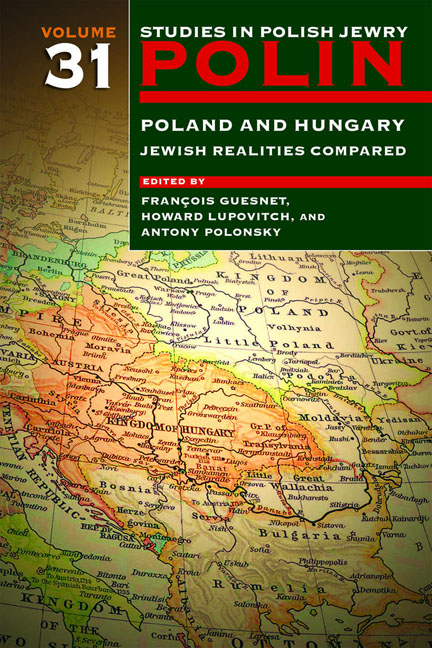Book contents
- Frontmatter
- Dedication
- Editors and Advisers
- Preface
- Polin
- Polin: Studies in Polish Jewry
- Contents
- Note on Place Names
- Note on Transliteration
- Part I POLAND AND HUNGARY: JEWISH REALITIES COMPARED
- JEWISH ACCULTURATION AND INTEGRATION
- JEWISH RELIGIOUS LIFE
- JEWS IN POPULAR CULTURE
- THE INTERWAR YEARS
- THE HOLOCAUST AND ITS AFTERMATH
- PERSONAL REFLECTIONS
- Part II NEW VIEWS
- Part III OBITUARIES
- Notes on the Contributors
- Index
Cabaret Nation: The Jewish Foundations of Kabaret Literacki, 1920–1939
- Frontmatter
- Dedication
- Editors and Advisers
- Preface
- Polin
- Polin: Studies in Polish Jewry
- Contents
- Note on Place Names
- Note on Transliteration
- Part I POLAND AND HUNGARY: JEWISH REALITIES COMPARED
- JEWISH ACCULTURATION AND INTEGRATION
- JEWISH RELIGIOUS LIFE
- JEWS IN POPULAR CULTURE
- THE INTERWAR YEARS
- THE HOLOCAUST AND ITS AFTERMATH
- PERSONAL REFLECTIONS
- Part II NEW VIEWS
- Part III OBITUARIES
- Notes on the Contributors
- Index
Summary
Kabaret literacki—‘literary cabaret’, a specific form of cabaret consisting of comedy sketches, monologues, and songs with satirical social and political content—was a revolutionary phenomenon in terms of Polish culture, Jewish culture, and notions of Polish national identity. It flourished mainly in Warsaw between the world wars —that is, in the capital of a newly independent nation that was also a great Jewish metropolis with a third of its residents identifying themselves as Jews or ‘of Jewish background’. This is not to claim that Warsaw held a monopoly on innovative, high-quality cabaret in Poland. The lively city of Lwów, long a centre for Polish theatre, offered stiff competition in the form of cabarets such as Ul and Chochlik and the very popular radio show, ‘Wesoła Lwowska Fala’. Nor did Warsaw's kabaret literacki attract the many Varsovian Jews who resisted Polish acculturation for religious and/or political reasons. The most innovative Yiddish-language kleynkunst theatre, Ararat, was in Łódź where its director, the poet Moyshe Broderson, provided songs and sketches, and the famous Yiddish comedy team of Shimen Dzigan (Szymon Dżigan) and Yisrael Shumacher (Izrael Szumacher), a voluble chatterbox paired with a phlegmatic straight man, performed. Yiddish cabaret arrived in the capital later, when director and actor Dovid Herman opened Azazel, and Dzigan and Shumacher toured with the Yidishe Bande.
Qui Pro Quo (1919–32), a 514-seat theatre squeezed into the Luxenburg Gallery, a shopping arcade on Senatorska Street, and its descendants—Banda (1931–3), Cyganeria (1933–4), Stara Banda (1934), Cyrulik Warszawski (1935–9), Małe Qui Pro Quo (1937–9) and, as some argue, Ali Baba (1939)—overturned a staid cultural hierarchy and popularized a pluralist Poland. The achievements of kabaret literacki rested in large part on the work of many Jewish artists—writers, composers, performers, musicians—and on the Jewish characters, sketches, and songs it regularly presented to an educated Jewish and Christian public. Though the Jews on both sides of the footlights were acculturated and spoke Polish, they did not mask their Jewish identity, embracing instead Warsaw's many types—Jews and Christians, aristocrats and workers, officers and flappers—as desirable and entertaining characters onstage.
- Type
- Chapter
- Information
- Polin: Studies in Polish Jewry Volume 31Poland and Hungary: Jewish Realities Compared, pp. 273 - 288Publisher: Liverpool University PressPrint publication year: 2018



